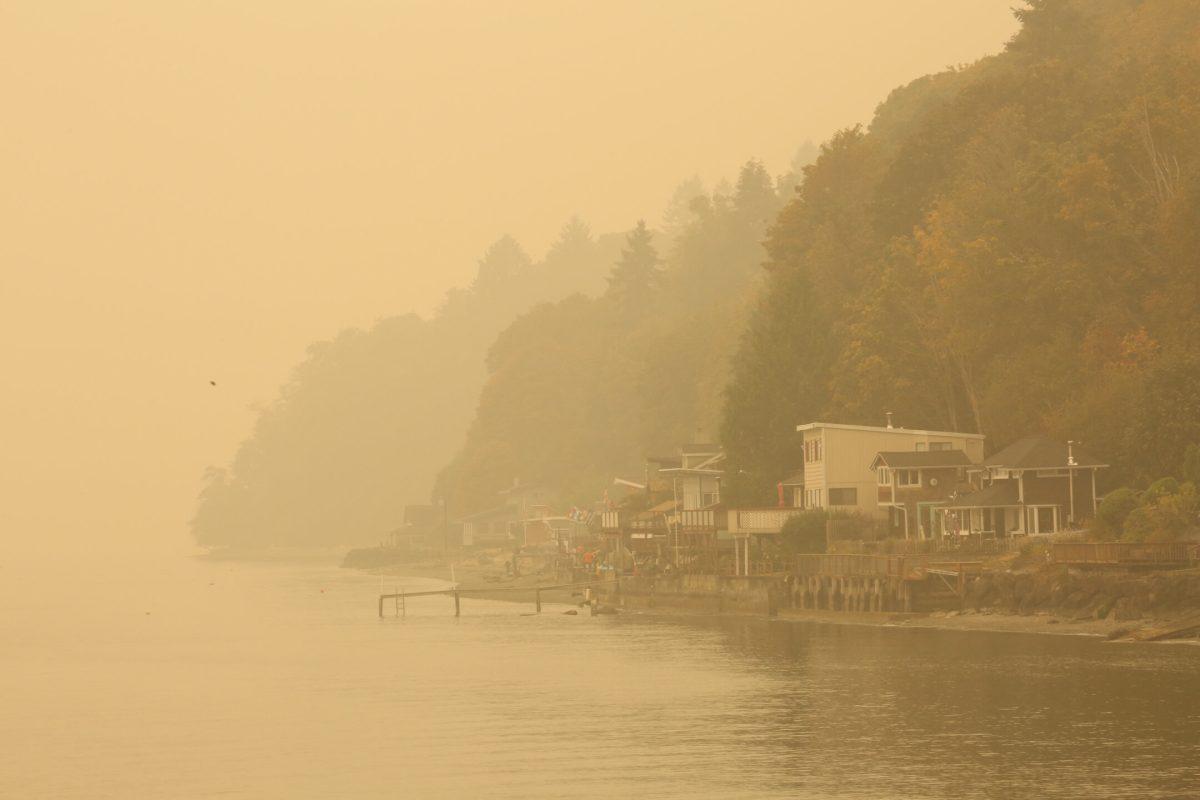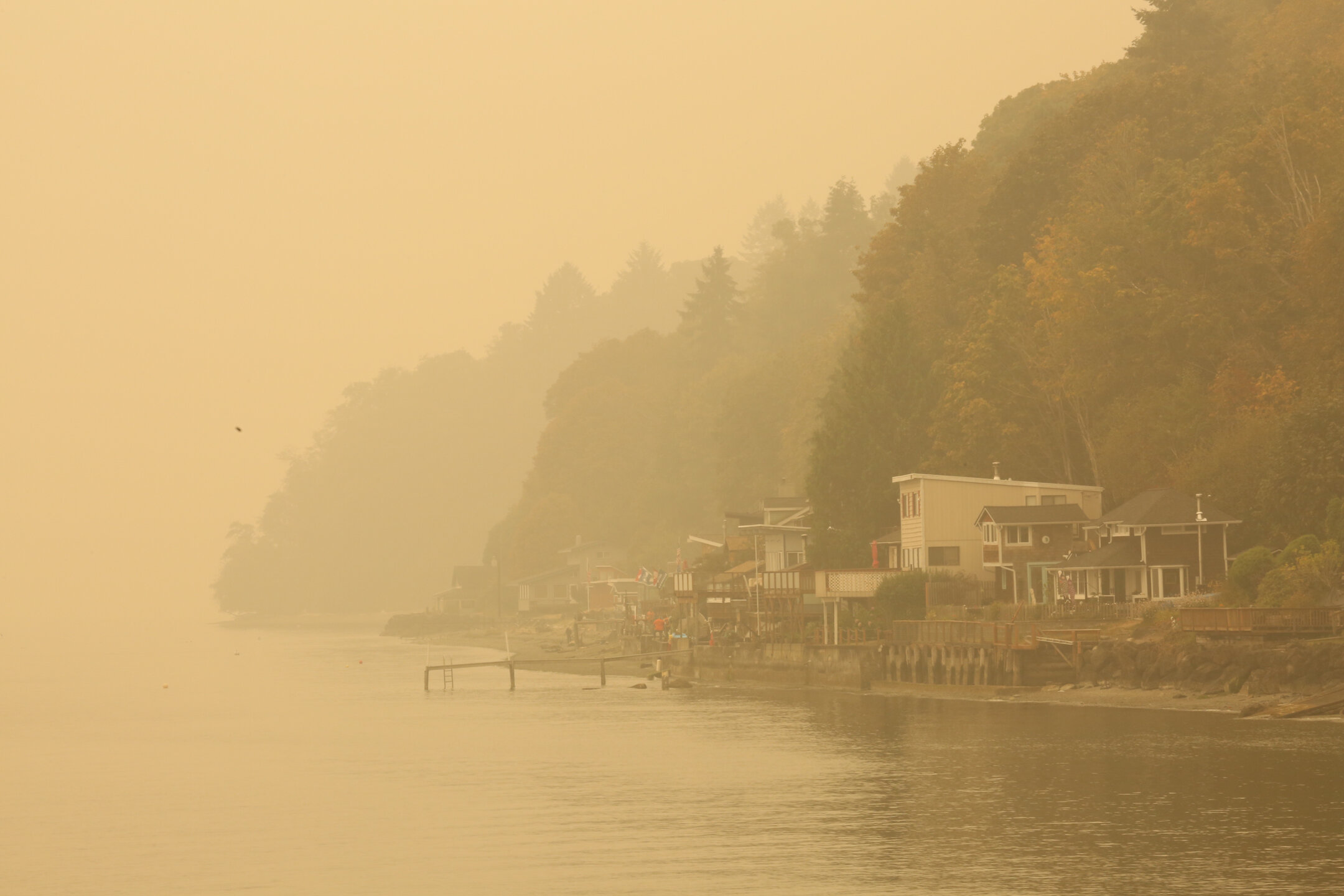Knox students and alumni from Pacific Northwest reflect on this fire season.
From mid-August through October, wildfires spread from California up the West Coast to Oregon and Washington. Over five million acres of land burned, and hundreds of thousands of people were evacuated. As these fires spread, many Knox students from the burning area moved to campus—some of them for the first time.
Hazy seasons in the summer are fairly routine across the Pacific Northwest. But to Marli Messner, Isaac Hughes and Mary DiPrete ’15—a freshman, senior, and alumni of Knox College, respectively—this fire season was markedly worse than what they experienced in past years.
“The time period between when it was just kind of an abstract conversation that was in the background and when it was immediate was like a day,” DiPrete said of the fires.
DiPrete grew up in her family’s house in Eola Village, OR. Now, she lives in Galesburg as an admissions counselor for prospective Knox students from the Pacific Northwest, and her mother lives in Eola.
DiPrete talked about the first photo she saw of the fires on Twitter: “I thought it was edited, of course, and was like, ‘This is really in poor taste that somebody would do this,’ and then realized, ‘Oh, no, that’s the sky.’”
Messner, from Redmond, OR, was also struck by the photos she saw just before she left home for Galesburg, saying that Salem, OR “looked like Mars, it looked out of a sci-fi movie or something.”
The weight of the fires hit Messner on her early morning flight from home to Knox. She remembers planning to sleep on the plane, and then seeing the fires from the plane.
“It was like, I can’t sleep,” she said.
Hughes is from Vashon Island, WA, but he is living in Galesburg now. His parents came back on a road trip in mid-September, returning to Vashon Island as smoke was reaching its peak. Throughout the drive from the Midwest back home, Hughes said, his mother updated him on the color of the sky—from orange to red to purple—as they drove closer to fires.
Hughes’s parents lived in his bedroom with an air purifier for days through the worst of the smoke.
“The pandemic has prepared them, and also everybody else, to be the masters at stay-at-home because you can’t even go outside of your house,” Hughes said.
He added, “I can’t imagine what it’s like for people who don’t have access to those resources or a place where there is clean air, or a proper, you know, respirator, because even inside the homes it gets hazy.”
DiPrete also spoke to the ways in which the pandemic prepared people for the fires. She has lived and worked in Portland before and has friends in leftist organizations there.
DiPrete noticed that many grassroots organizations “that have really come to the forefront to care for people during COVID, but also during the police riots, were also there for the wildfires,” she said. “And to compare that with the government’s total inability to help was, like, another startling move.”
“This has continued to shed light on the lives that people live incarcerated,” DiPrete said of the fire response. “Inmates were working, fighting fires, for nine dollars a day.”
She said that many people incarcerated in Oregon were moved under evacuation procedures to the Oregon State Penitentiary that had been a COVID-19 hotspot, endangering them in different ways.
The public’s upset at this move, she said, demonstrated that crisis “does make life feel more important.”
“I think there’s a way in which Oregon is kind of reteaching itself how to care about everybody, and that’s been a part of the grassroots-ness of it, and that really came to light,” she said.
Hughes explained that, because Vashon Island is an island, the prospect of evacuation never came into the fold. But he cited the ill health effects of poor air quality due to smoke as a concern for peoples’ futures on Vashon Island.
“If this becomes the norm, like what happened this summer,” he said, “I could see my parents considering [moving] somewhere else, which is hard to imagine because they love Vashon.”
In the years after DiPrete’s family moved to their Oregon home, wineries filled in the surrounding areas and many trees were clear-cut, she said, carving the path to potentially host wildfires. For DiPrete’s mother, evacuation was a possibility, but luckily her mother never had to leave the area.
DiPrete remembers when family friends lost their house to a fire years ago. She said the grief is often not about losing the house, but “all of this ephemera that we keep around ourselves, these little beautiful objects that we hold onto, those all burn.”
When DiPrete and her mother spoke over the phone in September about the prospect of her mother having to evacuate, they talked about the things she would take: their two dogs, DiPrete’s father’s ashes, the negatives of all their photos, a few favorite plates, her father’s knife collection and whatever else her mother could carry with whatever time she had.
Moving to Galesburg for the first time during the fires, Messner realized what she appreciates about home differently. The flatness of Galesburg stuck out to her, in comparison to mountainous Oregon, but also knowing that Oregon was burning made Messner think about what she could lose.
Messner kept in touch with her friends, hearing from them what phase of alert their areas were in. She said that no one she knew personally had to evacuate, but her family’s area “was just off the charts with terrible air quality.”
All they could do is stay home and “hope for rain,” said Messner.
DiPrete had her mother text her once in the morning and once in the evening through the worst of the fires, to make sure she was okay, but DiPrete said, too, that she came to accept the uncertainty of those hours when they couldn’t get in touch.
“There has to be some level of acceptance,” she said. “Nothing is a given.”
At the core of this wildfire season are the myriad effects of climate change. DiPrete recalls learning in grade school that “the Pacific Northwest would be that last place to be affected by global warming.” The fact that the fires are so extreme now, she said, “is deeply terrifying.”
Hughes studies Environmental Studies at Knox and he explained that these extreme fire seasons could be the new normal.
“The harder it is to ignore, the more compelled I am to work in this field,” Hughes said. “How we operate on Earth is going to change, but getting from A to B is really hard.”
“You don’t have to be in it to know that [climate change is] important,” Messner said, but she added that the wildfires have “definitely made it feel more urgent.”
DiPrete expressed how the fires have made her reframe her attitude during it all.
”You have to both hold the hope and the plan, and then also know that it could go away and to have some amount of acceptance around that,” DiPrete said.









Dax • Oct 29, 2022 at 2:22 pm
Hi thannks for sharing this